Character and Citizenship Education
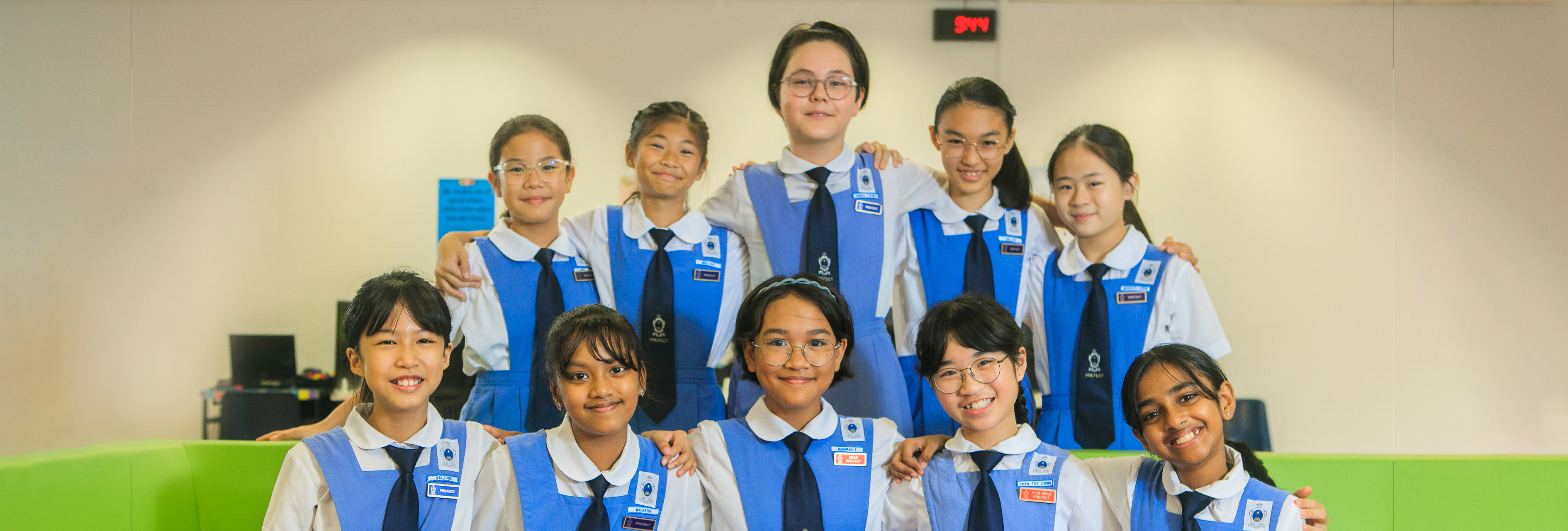
The Character and Citizenship Education Department aims to provide our students with multiple opportunities to develop and acquire values, knowledge and skills through varied classroom lessons and school experiences. Various platforms are used to create authentic learning experiences so that students will be able to put their learning into action for the internalisation of skills and values.
CCE Platforms
● Pastoral Care
● Canossian Spirituality
● Form Teacher Guidance Period (FTGP)
● National Education (NE)
● Values in Action (VIA)
● Character & Citizenship Education (CCE) lessons
● Sexuality Education
● Cyber Wellness
Pastoral Care
The Pastoral Care programme consists of weekly Pastoral Care (Catholic & Non-Catholic) lessons, liturgical events, termly values talks, and post-PSLE Programmes.
The school has designed a programme to teach values and life skills to our students. Imbued in the lessons are stories of the lives of our Canossian Saints and other individuals who have made contributions to mankind. We hope to inspire our children with the stories so that they can grow in their personhood.
Canossian Spirituality
The school believes that each child is precious, unique and deserves to be respected. In line with this belief, the school takes care of the spiritual growth of each child as a person through various celebrations and commemorations of events:
● Opening of School Year Mass
● Stations of the Cross
● Lenten Retreat for Catholic Students
● Rite of Reconciliation for Catholic Students
● Level Mass
● Easter Para-Liturgy
● May Devotion cum Mother’s Day Celebration
● St Anthony’s Feast Day Mass
● International Peace Day
● Children’s Day Mass
● Thanksgiving Liturgy
● P6 Thanksgiving
The Chaplaincy Team takes care of the faith formation of the Catholic students in the school. Sr Gerry, Sr Jessica, Sr Doreen and Sr Joanna, work with the Chaplaincy Team in the school to ensure that the strong are encouraged, the weak are supported and the indifferent are challenged, so that all may have ‘life to the full’ (John 10:10)
Form Teacher Guidance Period (FTGP)
The FTGP is time set aside each week for teachers to engage in quality interactions with their students so as to develop and strengthen their social and emotional competencies.
During the weekly FTGP lessons, teachers will conduct interactive sessions with their students so as to develop strong class bonds, create quality teacher-student relationships and to explicitly teach social and emotional competencies.
National Education (NE)
NE is infused into the core and non-core curriculum at St Anthony’s Canossian
Primary School. We aim to develop national cohesion, cultivate the instinct
for survival as a nation and instil in our students a sense of identity,
pride and confidence in our nation’s future. To do this, we provide varied
NE experiences:
● Commemoration of the 4 core NE events
● Total Defence Day
● International Friendship Day
● Racial Harmony Day
● National Day
● Learning Journeys
● P5 NE Show
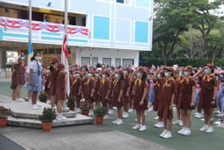
|
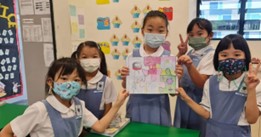
|
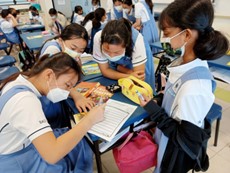
|
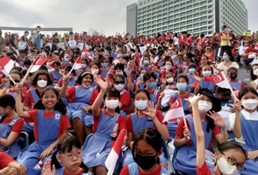
|
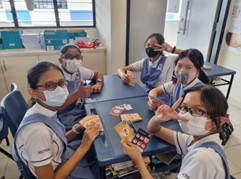
|
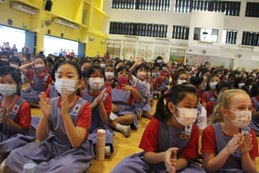
|
Values in Action @ SACPS
VIA are learning experiences which support students’ development as socially
responsible citizens who contribute meaningfully to the community. As part
of VIA, the students reflect on their experience, the values they have
put into practice and how they can continue to contribute meaningfully.
By serving others as a Canossian Service Leader, we hope our students will grow as persons embracing the school’s core values of Charity, Humility, Faith and Forgiveness.
SACPS VIA Projects for P3-P6 Students
Character & Citizenship Education (CCE) Lessons
Students learn values through three overarching ideas – Identity, Relationships
and Choices.
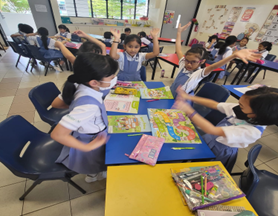
|
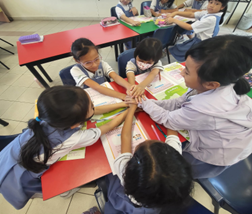
|
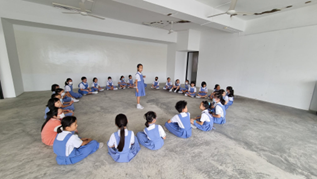
|
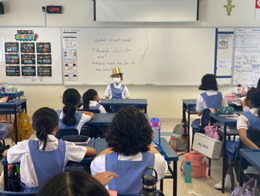
|
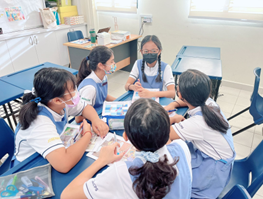
|
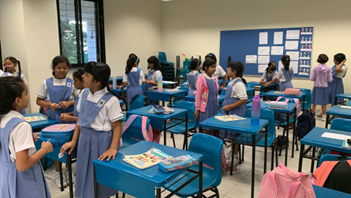
|
MOE Sexuality Education in Schools
1. Sexuality Education (SEd) in schools aims to enable students to understand the physiological, social and emotional changes they experience as they mature, develop healthy and rewarding relationships with others, including those with members of the opposite sex, and make wise, informed and responsible decisions on sexuality matters. SEd is premised on the importance of the family as the basic unit of society. This means encouraging healthy, heterosexual marriages and stable nuclear family units with extended family support. The teaching and learning of SEd is based on respect for the values and beliefs of the different ethnic and religious communities in Singapore on sexuality issues.
2. The Goals of Sexuality Education are:
(a) Support students in managing their physiological, social and emotional changes as they grow up and develop safe and healthy relationships.
(b) Guide students to make wise, informed and responsible decisions on sexuality matters.
(c) Help students develop a moral compass and respect for themselves and others by having positive mainstream values and attitudes about sexuality that are premised on the family as the basic unit of society.
3. The Key Messages of Sexuality Education are:
(a) Love and respect yourself as you love and respect others;
(b) Build positive relationships based on love and respect (which are the foundation for strong families);
(c) Make responsible decisions for yourself, your family and society; and
(d) Abstinence before marriage is the best protection against STIs/HIV and unintended pregnancies. Casual sex can harm and hurt you and your loved ones.
You may click here for more information on MOE Sexuality Education.
4. Sexuality Education is delivered in a holistic manner through the school curriculum. The content for Sexuality Education is grouped into five main themes: Human Development, Interpersonal Relationships, Sexual Health, Sexual Behaviour, and, Culture, Society and Law. You may click herefor more information on the scope of Sexuality Education in the school curriculum.
5. The subjects that incorporate topics on sexuality include:
(a) Science
(b) Character and Citizenship Education (CCE)
Sexuality Education Lessons:
6. The upper primary years mark the onset of puberty. With better nutrition and improved health care, children are reaching puberty at a younger age and have to grapple with physical, emotional and psychological changes in themselves. The implication is that our children are becoming biologically ready for sexual activity sooner without necessarily having the corresponding cognitive or emotional maturity to modulate their behaviours. Furthermore, our young are also exposed to a wide range of influences that could endanger health and undermine the integrity of the family. Our students require close guidance so that they can respond with discernment to the sexual messages in the media and other sources.
7. Sexuality Education (SEd) lessons are taught as part of CCE (FTGP) at Primary 5 and 6.Through these lessons, students will learn healthy ways to manage the physiological, social and emotional changes in their growing years. They learn to build healthy and rewarding relationships with others, including those with members of the opposite sex. Students are also guided to make wise, informed and responsible decisions to keep themselves safe from sexuality-related risks.
At St Anthony’s Canossian Primary School, the following Sexuality Education lessons will be taught in 2026:
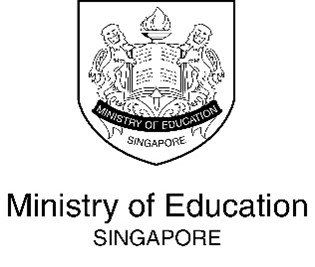
2026 Sexuality Education Lessons in CCE
Primary 5
|
CCE(FTGP) THEME |
LESSON TITLE / DURATION |
Lesson OVERVIEW |
TIME PERIOD
|
|
Growing Years |
The Changes in Me (60 min) |
This lesson focuses on helping students identify the emotions and stress caused by physical changes during puberty. Students will learn to describe the healthy ways to manage their negative feelings during this time. They will also learn to recognise that one’s identity need not be negatively affected, even when one’s body is experiencing changes due to puberty. This lesson is conducted separately for boys and girls in different classrooms, so that the students will feel more comfortable during the discussions. |
Term 4 |
|
Did You Know? (60 min)
|
This lesson focuses on helping students know what pornography is and how it can affect themselves and others. Students will learn about the dangers of being exposed to sexually explicit materials and reject the viewing and/or reading of pornographic materials. They will learn to evaluate their own responses when they encounter pornography by applying the strategy ‘Stop-Think-Do’. This lesson is conducted separately for boys and girls in different classrooms, so that the students will feel more comfortable during the discussions. |
Term 4 |
|
|
Keeping Myself Safe (60 min)
|
In this lesson, students will learn about sexual abuse, how it can happen during online and offline interactions and the impact of such abuse on victims. They also learn how to take precautionary measures to be safe and how to seek help for themselves and their friends. This lesson is conducted separately for boys and girls in different classrooms, so that the students will feel more comfortable during the discussions. |
Term 4 |

2026 Sexuality Education Lessons in CCE
Primary 6
|
CCE(FTGP) THEME |
LESSON TITLE / DURATION |
Lesson Overview |
TIME PERIOD
|
|
Growing Years |
Are We More than Friends? Lesson 1 (60 min) |
In this lesson, students will learn to distinguish between the characteristics of love and infatuation, and identify the strong emotions that may arise from experiencing the feelings of infatuation. They will recognise that experiencing feelings of infatuation is part of growing up and becoming infatuated with someone does not mean that they should be involved in a romantic relationship. Instead, they should focus on building strong and healthy friendships with their circles of friends. |
Term 3 |
|
Are We More than Friends? Lesson 2 (60 min) |
In this lesson, students will learn healthy ways to manage the emotions arising from infatuation and recognise the importance of respecting the boundaries of any relationship. They will also recognise the negative impact of teasing their peers who may be experiencing the feelings of infatuation and learn to behave maturely towards each other. |
Term 4 |
Information for Parents
-
Parents may opt their children out of Sexuality Education lessons, and/or supplementary Sexuality Education programmes by MOE-approved external providers.
9. Parents who wish to opt their children out of the Sexuality Education lessons need to complete an opt-out form. A hardcopy of the form will be distributed to parents in Term 2 for P5 and P6 students upon request. The completed and signed form is to be submitted to the school by the given date stated in the letter which will be sent via PG in Term 2.
Cyber Wellness (CW) @SACPS
Guided by the MOE CW framework, we aim to educate our students to be responsible
and knowledgeable Internet users and develop their instinct to protect
and empower them to take responsibility for their own well-being and to
make well-considered decisions in cyberspace.
Peer Support Leaders as Cyber Wellness (CW) Ambassadors
In SACPS, the peer support leaders are empowered and equipped with skills
to build a culture of positive peer influence, support their peers in cyber
issues and champion school-wide cyber wellness outreach efforts.
The roles of Peer Support Leaders include:
Teach and Advocate:
· Model good online habits and behaviours
· Share CW knowledge with the class to promote greater awareness of the threats of the cyber world.
Lead and Inspire:
· Be a positive influencer and leader to help their friends
· Alert a trusted adult (e.g. teacher) when their friends are in distress due cyber issues such as cyber bullying.
Cyber Wellness (CW) Programmes @SACPS
· CW Assembly talks
· CW Week
· Safer Internet Day
· CW lessons in FTGP
· Termly CW sharing by Peer Support Leaders
To find out more about Cyber Wellness Curriculum in schools, click here.
Cyber Wellness resources for parents
· https://www.moe.gov.sg/-/media/files/parent-kit/parent-kit—raising-a-digitally-smart-child.pdf
· https://www.moe.gov.sg/-/media/files/parent-kit/cyber-wellness-for-your-child.pdf

